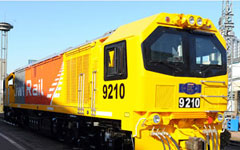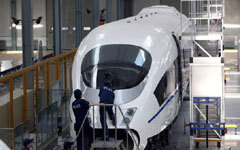Mainland initial public offerings are getting shunted to the sidelines in Hong Kong, long a preferred listing destination for Chinese companies, Emma Dai reports
It seemed like just another day on Hong Kong's stock market. At about 9:30 am, trading kicked off in a whirl.
|
 |
 |
But on May 22, the results of two initial public offerings confounded expectations.
Two chairmen of two companies posed for photos. One was Cui Dianguo of China CNR Corp Ltd, the nation's top high-speed train builder and the world's largest electric locomotive supplier. The other was Ng Wing-hong of Baguio Green Group Ltd, a Hong Kong company that handles the mundane business of keeping the streets, wet markets and airport clean in the special administrative region.
Nobody expected the road sweepers to outpace the bullet trains, but that's just what happened. Upon listing, only 65 percent of the shares of CNR's Hong Kong public offering were taken up, and they were priced at HK$5.17 (67 US cents), the lower end of the marketing range.
But Baguio Green's Hong Kong offering was oversubscribed by 429 times, and its shares were priced at HK$1.20, the very top of the range.
CNR's case isn't unique. Many companies from the Chinese mainland, even those confident enough to launch huge IPOs, have gotten the cold shoulder in Hong Kong.
On April 29, Henan-based WH Group Ltd, the world's largest pork producer, postponed its $5.3 billion debut in Hong Kong even after cutting the offer size by two-thirds. Demand was so weak that an underwriting team of 29 banks couldn't sell the shares.
In March, Harbin Bank Co Ltd set out to raise more than HK$10 billion. It ended up with just HK$8.77 billion, pricing the issue at the lower end of the range. The Hong Kong tranche of the issue was undersubscribed, so 219 million shares were allocated to international buyers.
"It has been increasingly tough to sell new listings in Hong Kong, especially the big ones," said Kevin Leung, director and strategist at Haitong International Research Ltd. "More and more long-onlys - traditionally big players in IPO subscriptions - are no longer keen to participate.
"IPOs performed badly in the past two years. A significant number of them have been trading below their issue prices," Leung said. "Buying them has cost institutional investors a fortune, let alone retail investors. In general, Hong Kong people are skeptical."
Big IPOs start with cornerstone investors. That involves a lockup period during which they can't sell any of their shares. However, Leung said, major institutional investors such as social security funds and sovereign wealth funds have become reluctant to accept lockups for fear of losing money if IPOs perform badly.
"Without securing these investors, it's even harder to launch large offerings," he said. WH Group was willing to list without cornerstone investors, a rarity in Hong Kong.
Leung added that big names are often too proud to price their shares cheaply.
"Sometimes their valuations are even higher than their listed peers. It might be legitimate, as these companies are industrial leaders. But the aggressive approach is not necessarily popular among investors. People used to think they could only get shares at the listing price or not at all. Now they believe the shares will decline sooner or later, so why worry?"
